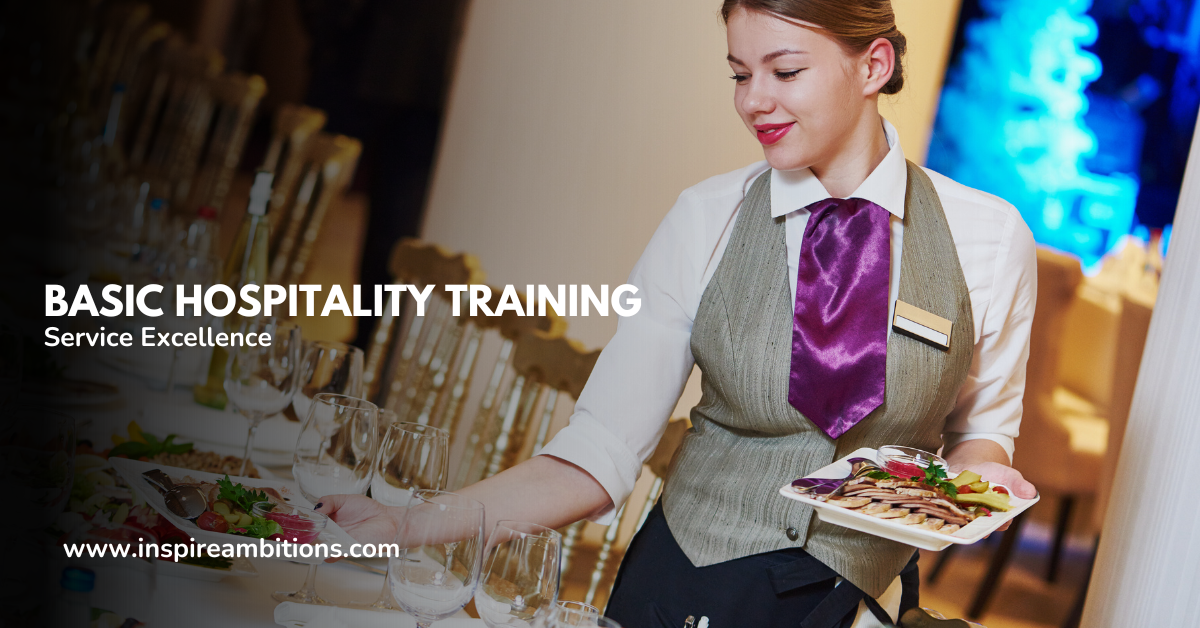Basic Hospitality Training – Essential Skills for Service Excellence
Providing exceptional guest service is pivotal to success in the ever-evolving hospitality sector.
Hospitality training is designed to equip you with the necessary skills to manage interactions with diverse clientele in various scenarios effectively. It is a continuous process that covers a wide range of competencies, from the fundamentals of customer service to technical knowledge specific to the hospitality and tourism industry.

Your journey in hospitality typically begins with an orientation that introduces you to your company’s culture and expectations, laying the groundwork for subsequent, more advanced training. To ensure operational excellence, you must understand the core principles behind your services, ranging from front and back-of-house operations to specialised roles in tourism and event management.
Basic Hospitality Training – Key Takeaways
- Comprehensive training enhances guest service in hospitality.
- Understanding company culture is critical to your acclimatisation within the industry.
- Advanced training covers specialised roles and management skills.
Foundations of Hospitality Training

In addressing your career in hospitality, it’s vital to grasp the foundational elements that contribute to excellence in this field. The training covers various aspects, from industry knowledge to management strategies, centred around enhancing the guest experience.
Understanding the Hospitality and Tourism Industry
To excel in hospitality, you must understand the breadth and interconnected nature of the hospitality and tourism industry. This includes recognising the roles within travel and tourism that contribute to the overall customer experience. An informed perspective on how these sectors operate together helps deliver services that build customer loyalty.
Principles of Customer Service in Hospitality
Outstanding customer service is at the heart of the hospitality industry. Training should equip you with the skills to personalise guest experiences and exceed expectations. This involves understanding guest needs and mastering the ability to respond effectively to feedback, ensuring customer satisfaction and repeat business.
Essential Communication Skills
Effective communication is a cornerstone of hospitality. It encompasses verbal, non-verbal, and written interactions with guests. From making bookings to resolving issues, your ability to convey information clearly and empathetically will define the quality of guest experiences.
Hospitality Management Basics
If you’re aspiring to be a new manager or are looking to strengthen your leadership skills, it’s essential to understand hospitality management. This involves learning about strategy, decision-making, and human resource management, all aimed at enhancing the operation of hospitality establishments.
The Significance of Teamwork
The success of any hospitality venture relies heavily on teamwork. Collaboration and support among staff are essential for a coherent operation. Training courses will emphasise working with colleagues to deliver consistent and high-quality service.
Educational Framework
Your education in hospitality can take numerous forms, from universities offering hospitality programs to specialised certifications and microlearning modules. Some institutions may employ gamification to enhance the learning process. This varied educational framework supports your development into a versatile hospitality professional.
Remember, each aspect of your training is designed to support your growth in crafting memorable, engaging guest experiences that reflect the highest standards in hospitality and tourism.
Operational Excellence in Hospitality

In hospitality, operational excellence underpins your ability to provide stellar guest experiences consistently. Mastering the various operational aspects ensures that every guest interaction is memorable, from a well-maintained room to a perfectly executed meal.
Hotel Operations Overview
Your grasp of hotel operations is crucial in delivering a smooth guest experience. This involves understanding the guest service standards spanning the four critical stages of a guest’s stay: pre-arrival, arrival, occupancy, and departure. These standards are directly linked to the quality of your accommodation and lodging services, from the front desk greetings to an efficient check-out process.
Housekeeping Protocols
Housekeeping forms the backbone of hotel operations, and your team should be well-versed in hotel housekeeping inspection. Regular corridor inspections and meticulous attention to room cleanliness ensure guest comfort. Always adhere to stringent cleaning and sanitising practices, maintaining a schedule inclusive of daily maintenance and deep cleaning routines.
Food and Beverage Operations
Your food and beverage services are a core component of the guest experience. Knowledge of bartending fundamentals, impeccable restaurant server service, strategic menu pricing, and designing a functional yet inviting restaurant layout are all vital. Remember to institute processes that facilitate culinary delights and timely and consistent service.
Safety and Sanitation Best Practices
Maintaining safety and following sanitation best practices are paramount in hospitality settings. This includes enforcing proper disinfection techniques and alcohol safety to protect guests and staff. Your team should be adept at using suitable cleaning agents and methods for different surfaces and settings, ensuring a hygienic environment throughout your establishment.
Guest Interaction and Satisfaction
When interacting with guests, your customer service skills should shine. Your ability to greet guests warmly, efficiently manage issues and complaints, and provide consistent service builds the foundation for a memorable guest experience. Hospitality training is vital to equip your team with the skills to improve guest interactions.
Remember, teamwork in the hospitality industry cannot be overstated, as the collective effort often leads to heightened customer satisfaction. Each role and responsibility intertwine, creating a harmonious execution that guests regard highly, prompting their return and referrals.
Advanced Hospitality Management
In this section, you’ll uncover how to refine your approach to managing the multifaceted operation of a hospitality business, ensuring your financial acumen, marketing prowess, leadership abilities, technological adoption, and problem-solving skills are at their peak performance.
Financial Management in Hospitality
To master financial management within hospitality, you must ensure accurate financial statements and implement effective hotel revenue management strategies. Regularly analyse your cash flow, balance sheet, and income statement to make informed decisions on pricing and investment.
- Crucial Financial Documents: Understand profit and loss statements, balance sheets, and cash flow statements.
- Pricing Strategies: Devise pricing models that respond to market demand and maximise revenue.
Marketing and Sales in Hospitality
Your marketing and sales efforts must boost customer satisfaction and build guest loyalty. Use targeted marketing campaigns and sales strategies to attract and retain a diverse clientele.
- Marketing Mix: Utilise a balanced mix of product, price, place, and promotion.
- Building Relationships: Focus on creating lasting relationships with customers through personalised experiences.
Strategic Leadership and Training
Effective leadership and strategic training are pivotal in steering your team towards providing an exceptional guest experience. Foster a culture of best practices and continuous improvement through robust training modules.
- Leadership Styles: Adapt your leadership style to suit your team and business strategy.
- Training Programmes: Develop comprehensive training programmes to support staff development and operational excellence.
Technological Integration
Embrace technology to enhance the efficiency and quality of service. From deploying a central reservation system to offering a book-a-demo service, technology can simplify operations and enrich guest interactions.
- Operational Technology: Implement systems for reservations, check-in, and facility management.
- Customer Interface: Utilise technology to streamline the guest experience, from booking to departure.
Handling Complex Challenges
Finally, sharpen your skills to manage complex situations such as dealing with demanding customers and handling complaints. Effective decision-making is critical to mitigating issues and preserving your establishment’s reputation.
- Complaint Resolution: Establish a systematic approach to addressing and resolving guest complaints.
- Crisis Management: Be prepared with a proactive crisis management plan for unforeseen events.
By mastering these advanced aspects of hospitality management, you’ll be better equipped to lead your organisation to sustained success in the competitive world of hospitality and tourism.







